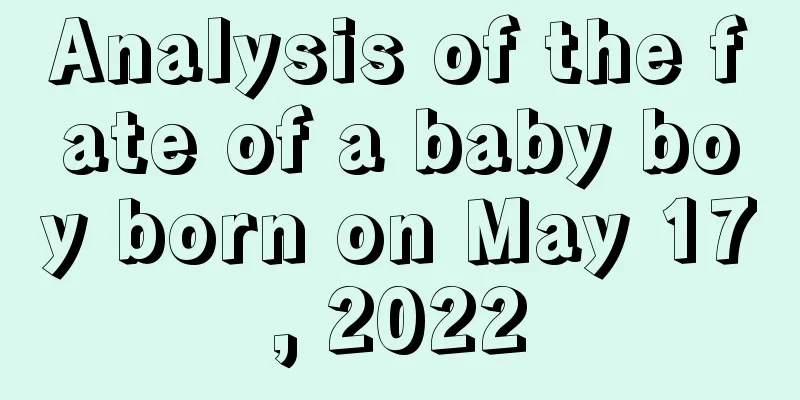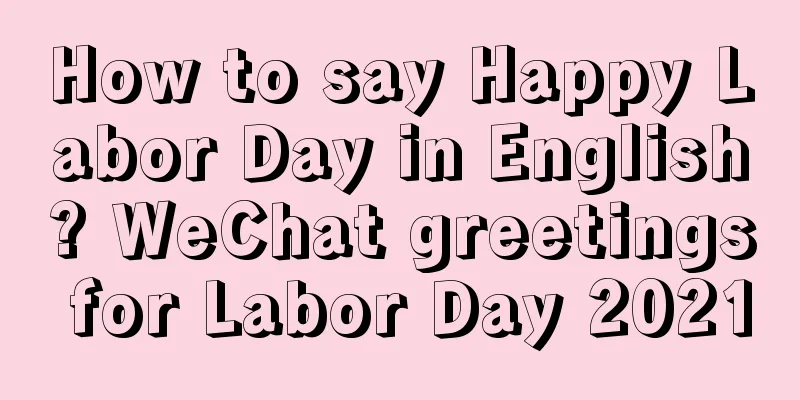What festival is on the eighth day of the fourth lunar month? Buddha Cleansing Festival? Buddha's Birthday?

Introduction: my country's lunar festivals are a colorful part of our country's festival culture. There are many traditional festivals in the Chinese lunar calendar with rich content. So, what festival is on the eighth day of the fourth lunar month? Let’s take a look at it together below! Various festivals and solar terms are wonderful. Mr. Shui Mo has compiled the lunar April for you to let you know the lunar calendar information about the God of Wealth and the God of Joy every day in April.What festival is on the eighth day of the fourth lunar month?The eighth day of the fourth lunar month is the Buddha Washing Festival.Introduction to Buddha Bathing FestivalBuddha Bathing Festival, also known as Buddha Bathing Festival and Buddha's Birthday Festival, is a Buddhist festival that falls on the eighth day of the fourth month in the lunar calendar. It is popularly believed that April 8th is the birthday of Sakyamuni, the founder of Buddhism.On that day, monks use famous incense soaked in water to wash Buddha statues, buy turtles and fish and release them into the wild, and Buddhist temples hold large-scale sutra chanting activities. "Wulin Jiushi" records: April 8th is the Buddha's birthday, and all temples hold Buddha bathing ceremonies. Monks and nuns compete to put bronze statues in small basins, soak them in sugar water, cover them with flower sheds, and welcome them with cymbals. They go to mansions and wealthy houses to water the statues with small ladles in order to seek benefits. On that day, there was a release of life event in West Lake. There were many boats, just like the small boats in spring, and people were competing to buy turtles, fish, snails and clams to release. In the old days, farmers would use the wind direction on this day to predict the price of grain. There is a saying: "If the south wind blows on the Buddha's face, it is not cheap even if there is harvest; if the north wind blows on the Buddha's face, it is not expensive even if there is no harvest." In Tibetan areas, on the Buddha's Bathing Festival, lamas gather together to chant the "Bath Sutra" and remove dust and clean the Buddha statues and pour water on them. Shakyamuni, called "Tathagata" (meaning "enlightenment") and Buddha (meaning "enlightened one") by Buddhists, is revered as the Buddha. What festival is on the eighth day of the fourth lunar month?The eighth day of April is Buddha's Birthday.Introduction to Buddha's BirthdayBuddha's Birthday is one of the biggest Buddhist festivals in my country. It commemorates the birthday of Sakyamuni.The orthodox Buddha's Birthday celebrations are still preserved in the Buddhist community of Shanxi Province. Among them, Mount Wutai is the most grand. At that time, each temple will enshrine the birth statue of Sakyamuni in the main hall. It is a standing image of a child (i.e. the prince statue) who is about three inches tall and looks cute and adorable. Naked, one hand pointing to the sky, the other to the ground. According to Buddhist legend, when Sakyamuni was born, he was able to stand, walk and speak. He points his right hand to the sky and his left hand to the earth, which means "I am the only one who is supreme in heaven and on earth." The statue of the prince was cast in bronze based on this legend. There is also a Buddhist legend that when Sakyamuni was born, nine dragons spit water to bathe him. At the beginning of the Buddha's Birthday celebration ceremony, a basin of fragrant soup made from dry land lotus, Taiwanese ginseng and other medicinal herbs will be placed in front of the prince's statue. The presiding monk lit lamps, burned incense, laid out offerings, knelt three times and bowed nine times, and then prostrated himself on the ground. All the monks chanted sutras, drums and music played, and they recited poems in praise of Sakyamuni's great contribution to the human world. After the sutra is finished, the statue of the prince is bathed in fragrant water. After bathing, they recite scriptures, dance and sing, and repeat this many times. This is called the Dharma Assembly. The Dharma Assembly ended and we had a dinner together. Then they were led to the Buddha bathing incense area and returned to the monks' rooms to add hot water to bathe themselves, in the hope of obtaining the right result as soon as possible. The Buddha's Birthday festival spread to the common people and formed into temple fairs. For example, Shouyang County holds the Tianfo Temple Fair on the eighth day of April every year to worship the Buddha. There will be huge crowds of people and it will be very lively. In the folk tradition, Buddha's Birthday has evolved into a festival to commemorate other gods and other folk activities in many places. In Datong, Yanggao and some counties in northwestern Shanxi, the Buddha's Birthday has evolved into a grandmother's temple fair. The objects of worship changed from men to women, and foreign gods became local gods. The Grandma God, also known as the Child-Giving Grandma, is often accompanied by various stories that are popular among the local people, making her seem mysterious and bizarre. In addition to curing all diseases, exorcising evil spirits and bestowing blessings, his magical power also includes the gift of children to families who are eager to have children. As long as the person praying is sincere, he will be able to have a child. It certainly seems superstitious today, but it had a great influence in history, reflecting the traditional mentality of the Chinese nation that "there are three unfilial acts, and the worst is to have no descendants." There are many salt ponds in Yuncheng area. According to folklore, they were left behind when Emperor Huangdi fought Chiyou on the eighth day of April. April 8th is a special day to commemorate this event. Legend has it that in order to distinguish between friend and foe during the war, Huangdi's soldiers wore soapberry leaves on their heads, while Chiyou's soldiers wore locust leaves on their heads. In the end, Huangdi defeated Chiyou. People today are all descendants of Huangdi. In order to commemorate the victory of their ancestor, men, women, young and old would wear soapberry leaves on their heads, and this became a custom. On April 8th, there is a temple fair in Lingshi County. In the courtyard behind the temple, peonies are in full bloom. They are gorgeous, colorful, and elegant. Many people go to admire them, which symbolizes wealth and prosperity. It is commonly known as "watching the divine flower fair." The temple fair on the eighth day of April in Xiangning County is commonly known as the Oil Cake Fair. During the festival, there are as many as forty or fifty fried cake stalls in the mountain town which is less than one square kilometer. Those who attend the fair are proud to eat their fill of fried cakes. Some people in the countryside cannot go to the county town to attend the fair due to old age or illness, but they will ask others to buy a few bags of oil cakes to share the joy at home. On the eighth day of the fourth lunar month in Lin County, women go to Changshou Mountain (also known as Zhenwu Mountain) to burn incense and pray for blessings. There is an ancient poem circulating in the local area: "Sweat wets the light mist around, and the colorful skirt reflects spots on the single flower. Why don't you return the incense and climb the rugged Changshou Mountain to repay your wish?" It vividly describes the scene and mentality of people burning incense. Summary: After reading the introduction in the above article, I believe everyone has a new understanding of what festival the eighth day of the fourth lunar month is. You can learn about it and gain some knowledge! |
>>: The eighth day of the fourth lunar month: Ox Soul Festival, commemorating the Holy Lord Guandi
Recommend
Going back to work after the Spring Festival, is Aries' love fortune good?
Introduction: The Spring Festival holiday is gradu...
What is the date of January 17th in the lunar calendar in 2018? Is it an auspicious day?
Introduction: In our country’s traditional culture...
Is it a good time to get a haircut on May 24th of the lunar calendar in 2018? What does the hexagram look like?
Introduction: The fifth month of the lunar calenda...
Is the third day of the first lunar month in 2021 Valentine's Day? What Valentine's Day is on February 14?
Introduction: The new calendar days corresponding ...
Can I have sex on the beginning of spring? What should I do if I have sex on the beginning of spring?
The different festivals during the 24 solar terms ...
What is the fate of a baby girl born on February 19th of the lunar calendar in 2022?
The fortune of a baby girl born every day is diffe...
When is the expected date of delivery for pregnancy on New Year's Day, January 1, 2020? Countdown to New Year's Day 2020!
Introduction: The due date of pregnancy is differe...
Is it good for a boy born on the fifth day of the tenth lunar month in 2018? What is his fate?
Introduction: Countless new lives are born on diff...
Is February 22, 2020 suitable for haircuts? What should I pay attention to when shaving my child's head?
Introduction: You also need to choose an auspiciou...
Is June 22, 2018 a good day to sign a contract? When is the auspicious time on that day?
There are many tricks involved in choosing an ausp...
Is the first day of the eighth lunar month in 2019 a good day to worship ancestors?
Ancestor worship is a way for us to remember and m...
When will I give birth if I get pregnant during the Dragon Boat Festival in 2022? Will the child be blessed?
The Dragon Boat Festival is also known as the May ...
Is it a pure yin fate to be born on the summer solstice in 2022? Is it a good fortune to be born on the summer solstice?
The summer solstice is the fourth solar term in su...
How about the lunar December 28th, 2018? Is it a good day?
It is the twelfth month of the lunar calendar in ...
Is it a good idea to move house on the fourth day of the fourth lunar month in 2019? Can I move to a new house?
The fourth month of the lunar calendar marks the ...









